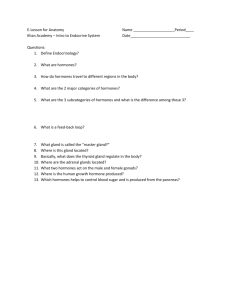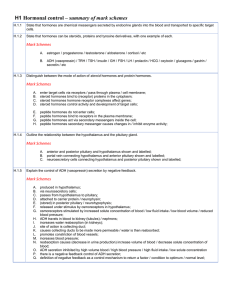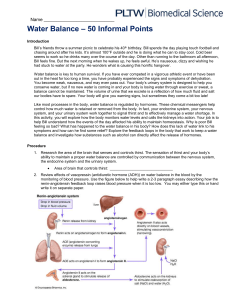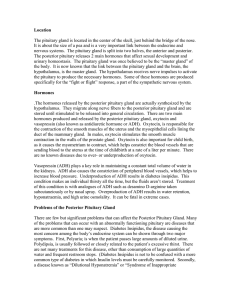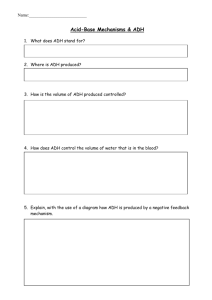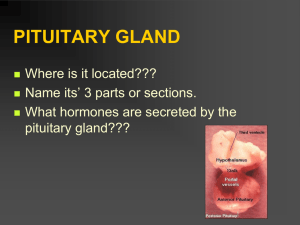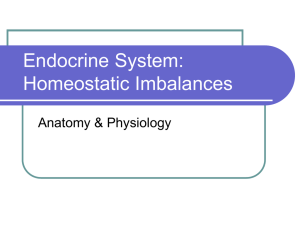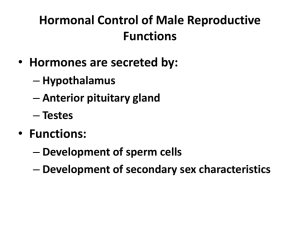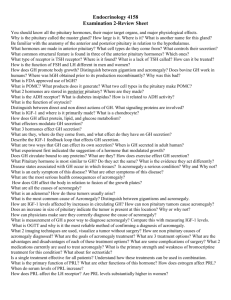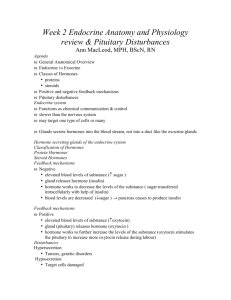Pituitary Gland Seifert Thorne
advertisement
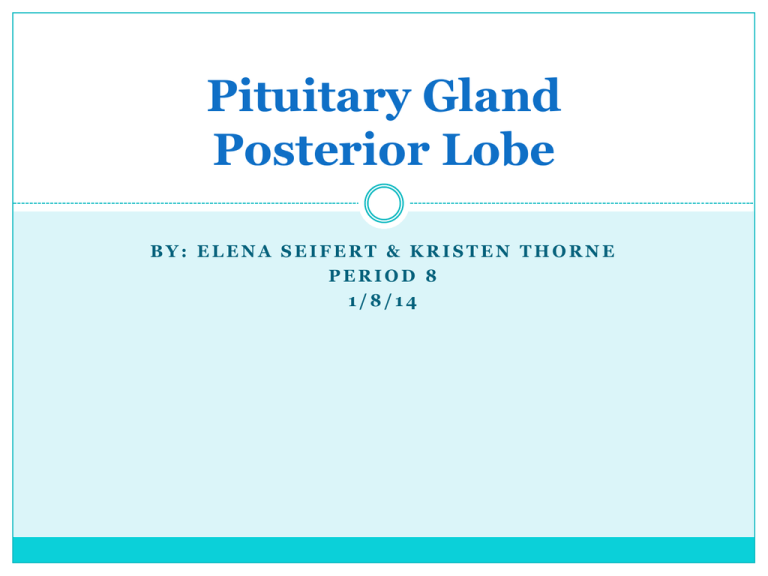
Pituitary Gland Posterior Lobe BY: ELENA SEIFERT & KRISTEN THORNE PERIOD 8 1/8/14 Location Part of the brain What type of hormones are produced? ADH (antidiuretic hormone) Oxytocin How do these hormones affect the body? ADH- Promotes reabsorption of water by the kidneys Oxytocin- strongly affects human social interactions, stimulates uterine contractions during childbirth and facilitates breast feeding AKA the “love hormone” Maintenance of homeostasis ADH- helps maintain water and electrolyte balance The pituitary and the hypothalamus glands work together to regulate the release of other hormones in the body. Feedback Mechanisms ADH- when there is not enough water in the blood ADH is secreted so the kidneys reabsorb water (negative feedback) Oxytocin- during childbirth, oxytocin is released to stimulate uterine contraction and lactation from the mammary glands (positive feedback) Antagonistic Hormones Vasopressin Receptor Antagonist (VRA)- blocks ADH for those with congestive heart failure Atosiban (oxytocin receptor antagonist)- blocks Oxytocin to control emotions and hormones Disorders With a damaged or malfunctioning pituitary gland, your body would lose the normal ability to regulate the hormones released by most endocrine glands. Disorders of the posterior pituitary gland are: diabetes insipidus Syndrome of Inappropriate Antidiuretic Hormone Secretion (SIADH) Diabetes insipidus Condition where the kidneys are unable to conserve water due to lack of ADH Symptoms Extreme thirst Excessive urine volume Treatment Medication (vasopressin) SIADH Condition where high levels of ADH cause the kidneys to absorb excessive amounts of water. Symptoms Nausea/vomiting Cramping Seizures Coma Treatment Surgery to remove the gland releasing ADH Medication to block ADH Sources http://someinterestingfacts.net/wp-content/uploads/2012/12/Pituitary-gland.jpg http://droualb.faculty.mjc.edu/Course%20Materials/Physiology%20101/Chapter% 20Notes/Fall%202011/chapter_6%20Fall%202011.htm http://scientopia.org/blogs/scicurious/2009/11/09/oxytocin-starting-with-thebasics/ http://www.emoryhealthcare.org/pituitary/pituitary-gland.html http://faculty.clintoncc.suny.edu/faculty/michael.gregory/files/bio%20102/bio%20 102%20lectures/endocrine%20system/endocrin.htm http://www.frontalpioneer.com/2013/04/adhoxytocinprolactin-podcast.html http://www.drugs.com/drug-class/vasopressin-antagonists.html http://www.lpch.org/DiseaseHealthInfo/HealthLibrary/diabetes/siadh.html http://www.ncbi.nlm.nih.gov/pubmedhealth/PMH0001415/#adam_000377.diseas e.symptoms http://www.urmc.rochester.edu/Encyclopedia/Content.aspx?ContentTypeID=90& ContentID=P01974
